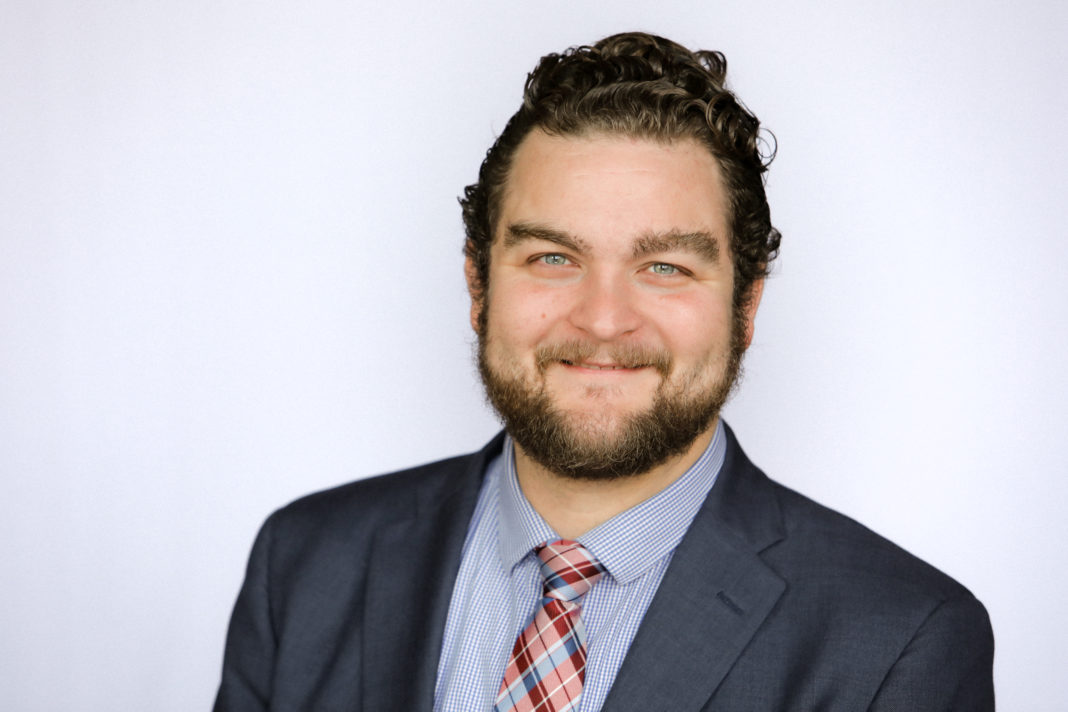Alex Morrison is the executive director of the Macon-Bibb County Urban Development Authority (UDA). He graduated from Mercer University in 2007 with bachelor’s degrees in journalism and philosophy and earned his master’s degree in public administration from the University of Georgia.
Here are five things to know about Morrison.
1. His interest in downtown development began at Mercer.
Morrison was one of four students who developed the initial plans for the College Hill Corridor, a 2-square-mile area that connects the Mercer campus and downtown Macon, for their senior capstone project. He grew up in Pike County and fell in love with Macon during his time at Mercer. After earning his master’s degree, he returned to work for Macon-Bibb County for a year and started the Main Street Macon program.
For the last nine years, he has served in his current role with the UDA, which promotes downtown Macon, ensures ordinances and regulations are in place and followed, and provides public funding for projects. As the sole employee of the agency, he does everything from running day-to-day operations to doing strategic planning and developing long-term projects.
“We do the necessary and good things to make sure that the best interest of the citizens are looked after in downtown Macon,” he said. “It’s an interesting role because it’s economic development, but it’s also about making sure that you’re harnessing and helping growth that’s inclusive for all citizens because downtown belongs to everybody, not just a few residents or business owners.”
2. He takes pride in his work.
Macon has seen dramatic, positive change over the last 10 years, and Morrison said he’s grateful to have played a part in that. He counts the comprehensive Macon Action Plan launched in 2015; improvements to the Dempsey Apartments, which house low-income seniors; the transformation of the Mill Hill neighborhood into an arts village; and the addition of parking meters in downtown Macon among his proudest achievements with the UDA.
“Investing in downtown is an investment in the entire community, and it’s the battery that powers the rest of the growth in the community,” he said.
“We’ve improved so many people’s lives through the work in downtown Macon, whether that’s the residents of the Dempsey or people who have been able to start a small business that they never thought they’d be able to. People who thought they’d never be able to own a home or get out of a bad situation financially, we’ve been able to assist them,” he said.
3. His two majors have intersected in his career.
Morrison studied both journalism and philosophy while at Mercer and didn’t think he would go into public administration. However, his degrees in those subjects helped him expand his mind and learn to think through advanced topics, and that’s proven to be extremely relevant and applicable in his career.
His journalism training showed him how to analyze information in a gate-keeping way, recognize what people need and want to know, and effectively communicate. His philosophy training, on the other hand, taught him to contemplate long term about how projects are going and if they are progressing as they should.
4. He was at Mercer during a time of change.
The years 2003-2007 were an “interestingly great” time to be at Mercer, Morrison said. One defining “Mercerian moment” during his college career came in November 2005 when he was editor-in-chief of “The Cluster” student newspaper.
He and features editor Emily Hill published a special four-page edition in support of the LGBTQ+ community and promoting a student-led “We Are Mercer” rally in the wake of the Georgia Baptist Convention’s decision to sever ties with Mercer.
“That rally was done by students to show solidarity in the wake of that decision. As students, we were stating that we believed that (Mercer was) on the right path,” Morrison said. “That’s a moment that I look back on and that was something that I was extraordinarily proud of being involved in and of Mercer for not shying away from that moment. It’s one of those moments in Macon and Mercer history that was a signal to the world that this is a loving and supportive place.”
5. He wants to build connections.
“I’m not thinking about what’s next in my career; I’m thinking about what’s next for Macon,” Morrison said.
He has lots of hopes for Macon’s future, but one thing he always comes back to is the Ocmulgee Heritage Trail. The bike and pedestrian activities of the trail have been a real uniting force over the last two decades, and he would like to see the trail expanded to reach other areas of Macon.
Refocusing energy from building things for cars and commerce to building things for people can help turn around blighted and disinvested neighborhoods.
“If you can start building those tangible connections between neighborhoods with infrastructure, it logically follows that you can start building relationships between people of different backgrounds,” Morrison said. “It’s really easy to hate people you don’t know, and really easy to love people that you do. … The small things are what adds up to the big things.”










